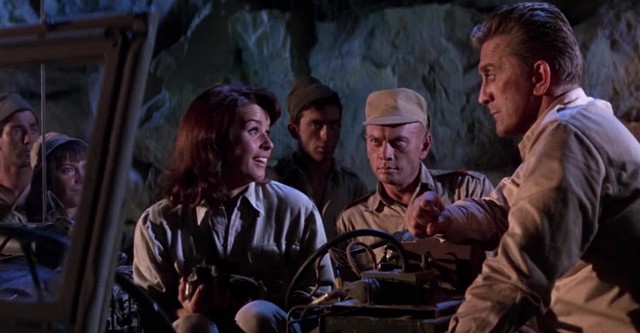
It is Memorial Day. With that in mind I set about looking for a war film to watch and write about. War movies are not a genre that I particularly like or have much interest in (with a few exceptions). When I happened upon Cast A Giant Shadow (1966) I thought “Kirk Douglas and John Wayne did another film together besides The War Wagon (1967)?” Then I looked closely at the rest of the cast and was astonished to see that Angie Dickinson, Senta Berger, Yul Brynner, Frank Sinatra, and Topol also starred. If Topol is in it, how can I pass it up?
Regrettably I wasn’t thinking about the film in its historical context. In the mid to late sixties the Hollywood studios had wholly embraced Stanley Kramer’s formula of casting everyone who is someone in their movies, even if it is a big name in a small part. It’s a lot like what Marvel has been doing with their movies. However, the point is that these epic movies with giant all-star casts are almost always boring. Cast A Giant Shadow was no different.
That isn’t to say that not much happens in Cast A Giant Shadow. Kirk Douglas comes back from WWII only to run off and join the fight for an independent Israel only to come back home briefly to return to Palestine again. Douglas’ character and the events of the film are all taken from the life of Col. David Marcus, a Jewish-American war hero who reconnected with his heritage and fought for Israel. The history of this struggle and Col. Marcus’ role in it is fascinating stuff and it’s clear why writer, producer, and director Melville Shavelson wanted to make this film.
Unfortunately Shavelson had very few ideas as to how to bring the martyred Col. Marcus to life on the big screen. Cast A Giant Shadow is remarkably repetitive as explosive scenes of combat are consistently bookended with scenes of Kirk Douglas complaining about how no one listens to him. The romance between Douglas and Berger gets very little development at all and the dramatic stakes of infidelity are only superficially explored. Cast A Giant Shadow is focused on Marcus’ mission and presents that mission with no variation at all.
Before taking on the historical epic Melville Shavelson worked primarily in light comedy. During the fifties Shavelson directed not one, but two Danny Kaye vehicles. Neither of these Danny Kaye pictures are bad, but they aren’t all that memorable either. A Danny Kaye adventure is, of course, vastly different from a film about political revolution and post-colonialism. I think it is safe to say that the workman-like Shavelson’s ambitions out matched his artistic ability.
That said, there is something comforting about even the most mediocre war film made during this period for me. Films like Cast A Giant Shadow were the kinds of films my father would rent for me when I was out sick from school or on summer vacation. The slow ambling pace, the chest thumping, and cartoonish patriotism made these films strange and totally unreal to me. When I was sick as a kid, and my head was foggy, a film like Cast A Giant Shadow could engage me in that dazed state; telling its story in the same dizzy syntax.
Honestly it’s most likely going to be nostalgia or an intense devotion to a movie star that is going to bring viewers to Cast A Giant Shadow today. It’s difficult to ignore Shavelson’s condemnation of British colonialism and his paradoxical championing of American imperialism. Cast A Giant Shadow is a film of its moment that, unlike the great war films such as Bitter Victory (1957), refuses to critique or enter a discourse with said historical moment. Cast A Giant Shadow is history as picture-book spectacle.
